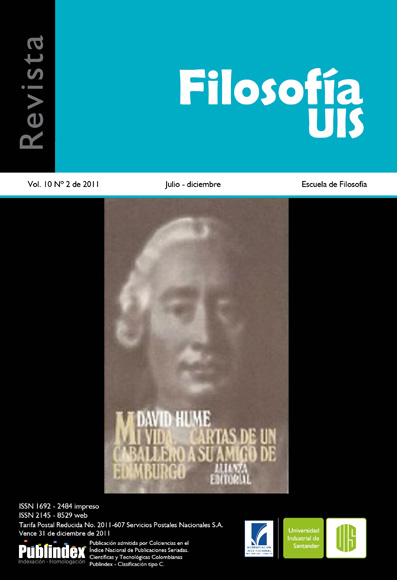Publicado 2011-10-10
Palavras-chave
- reminiscencia,
- pitagorismo,
- aprendizaje,
- preexistencia,
- alma
Como Citar
Copyright (c) 2011 Nemrod Carrasco

Este trabalho está licenciado sob uma licença Creative Commons Attribution 4.0 International License.
Resumo
El Fedón es un diálogo en el que habitualmente encontramos la doctrina de la reminiscencia, una teoría que suele interpretarse como la respuesta platónica al origen del conocimiento. Desde esta perspectiva, el argumento acerca de la reminiscencia consiste en decir que el alma ha contemplado las ideas en la existencia pre-terrenal y recuerda a raíz de la percepción sensible. La lectura del Fedón quiere poner entre paréntesis esta interpretación doctrinal de la reminiscencia para poder fijarnos así en la totalidad del argumento en su literalidad. La tesis a defender es que el Fedón presenta un argumento platónico de confrontación entre dos modelos cognoscitivos antagónicos y considera la reminiscencia socrática como una apuesta decidida por el aprendizaje filosófico.
Downloads
Referências
- Ackrill, John Lloyd (1973). “Anamnesis in the Phaedo”, en: E.N Lee, A.P.D Mourelatos y R.Rorty (eds.), Exegesis and Argument, Assen, pp. 177-195.
- Aristóteles (1970). Metafísica, Madrid: Gredos.
- Bostock, David (1986). Plato’s Phaedo, New York: Claredon Press.
- Burger, Ronna (1984). The Phaedo: A Platonic Labyrinth, New Haven and London: Yale University Press.
- Cornford, Francis (1935). Plato’s Theory of Knowledge, London: Kegan Paul.
- Dimas, Panos (2003). “Recollecting forms in the Phaedo”, En: Phronesis, Vol. 48, N.° 3, pp. 175-214.
- Dorter, Kenneth (1972). “Equality, recollection and purification”, En: Phronesis, N.° 17, pp. 198-218.
- Ebert, Theodor (2006). “Comment lire le Phédon?”, en: André Laks y Michel Narcy (eds.), Philosophie Antique, N.º 6, pp. 5-27.
- Fine, Gail (1993). On Ideas, New York: Oxford University Press.
- Franklin, Lee (2005). “Recollection and philosophical reflection in Plato’s Phaedo”, En: Phronesis, Vol. 50, N.° 4, pp. 289-314
- Gallop, David (1982). “Plato’s cyclical argument recycled”, En: Phronesis, N.° 27, pp. 207-222.
- Gulley, Nelson (1954). “Plato’s theory of recollection”, En: Classical Quaterly, N.° 4, pp. 197ss.
- Guthrie, William Keith Chambers (1962). A History of Greek Philosophy, 4: Cambridge University Press.
- Hackforth, Reginald (1933). Plato’s Phaedo, Cambridge University Press.
- Hackforth, Reginald (1952). “Review of the interpretation of Plato’s Republic”, En: Classical Review, N.° 2.
- Haynes, Richard P. (1964). “The form of equality as a set of equals”, En: Phronesis, N.° 9, pp. 20-26.
- Kelsey, Sean (2000). “Recollection in the Phaedo”, En: Proceedings of the Boston Area Colloquium in Ancient Philosophy, N.° 16, pp. 101-110.
- McCabe, Mary (1994). Plato’s Individuals, Princeton: Pricenton University Press.
- Mills, K.W. (1957). “Plato’s Phaedo 74b6-c6”, En: Phronesis, N.° 2, pp. 129-133.
- Nehamas, Alexander (1999). “Plato on the imperfection of the sensible world”, En: American Philosophical Quaterly, N.° 12, pp. 151ss.
- Osborne, Catherine (1995). “Perceiving particulars and recollecting forms in the Phaedo”, En: Proceedings of the Aristotelian Society, N.° 95, pp. 211-233.
- Platón (1987). Menón, Madrid: Gredos.
- Rowe, Christopher (1991). “Philosophy and literature: the arguments of Plato’s Phaedo”, En: Proceedings of the Boston Area Colloquium in Ancient Philosophy, N.° 7, pp. 174ss.
- Sales, Jordi (1992). Estudis sobre l’ensenyament platònic, Barcelona:Anthropos.
- Scott, Dominic (1987). “Platonic anamnesis revisited”, En: Classical Quaterly, N.° 37, pp. 346-366.
- Scott, Dominic (1995). Recollection and Experience, Cambridge: Cambridge University Press.
- Schofield, Malcolm (1998/2002). “Plato”, En Craig (ed) Routledge Enciclopedy of Philosophy, London: Routledge.
- Silverman, Allan (2002). The Dialectic of Essence: Plato’s Metaphysics, Princeton: Princeton University Press.
